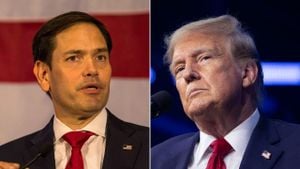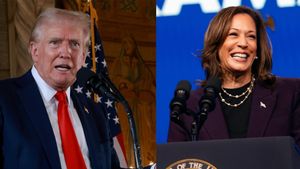With the inauguration of President Donald Trump approaching, political watchers are keeping their eyes peeled as he begins to assemble his new cabinet. Following his October rally where he hinted at appointing former rival Robert F. Kennedy Jr. to lead healthcare initiatives, speculation about the future of U.S. health policy stirs. At the same time, Trump’s other cabinet appointments are stirring up plenty of conversation.
Kennedy, known for his controversial stance on vaccinations and connections to health-related rhetoric, left supporters and critics alike wondering what his role would entail. Trump, who remarked he would let Kennedy "go wild" on health policies, indicated he wants to see measurable results, namely the reduction of chronic diseases within two years. Kennedy responded affirmatively, expressing his commitment to make those results happen.
Uncertain of whether Kennedy will hold a position such as the head of the Department of Health and Human Services (HHS) or the Centers for Disease Control and Prevention (CDC)—both roles traditionally filled by doctors—his influence with public health could significantly shape the future of U.S. healthcare.
Taking center stage of Kennedy's agenda are two issues: fluoride levels in drinking water and vaccination policies. On fluoride, Kennedy has voiced the need to reevaluate its safety, disputing its long-standing reputation as beneficial for dental health. Even though the CDC considers fluoride to be one of the major public health achievements of the 20th century, connected studies about its effect on child IQ have stirred disagreements.
Experts, such as Dr. Leighton Ku from George Washington University, believe the federal government lacks the authority to impose regulations on water fluoridation. For Kennedy to effect change, he would need to work with local and state authorities, presenting his views more as suggestions rather than mandates.
The vaccination picture appears equally murky. Kennedy's time as an anti-vaccine advocate is notable, claiming, “there's no vaccine that's safe and effective.” While some of his assertions, such as linking vaccines to autism, have been soundly debunked, he argued there are large gaps in vaccine safety data and pledged to alter vaccine regulations should he secure power.
Katrine Wallace, Ph.D., emphasized the dangers if Kennedy is leaned on to develop health policies related to vaccinations, warning it could lead to increased vaccine-preventable diseases. For all his claims of increased transparency and safety, expert consensus maintains vaccinations are thoroughly researched and backed by empirical evidence.
While questions swirl about his influence on health policies, Trump is simultaneously curbing Cabinet choices likely to make waves across the political spectrum. His selections, which range from controversial to conventional, include Rep. Matt Gaetz as Attorney General and Pete Hegseth for Secretary of Defense. One cabinet selection moving forward, Sen. Marco Rubio for Secretary of State, appears relatively standard compared to others.
This juxtaposition—legitimate selections like Rubio versus outlandish choices such as Gaetz and Hegseth—could highlight Trump's strategy to both please his base and press buttons among traditional party members. Republican observers suggest these appointments signal Trump's continued attempts to reshape the party and assert control over the political narrative post-election.
Political analyst Scott Jennings pointed out the unpredictability of some of Trump's picks, asserting, "Some of them are clearly aimed at shaking things up—especially those closer to his core ideological base." He believes Trump may likely push through even contentious nominations now, claiming legitimacy from his electoral mandate.
Complications could arise, as Gaetz, known for combative politics, has faced ethics investigations and might challenge Trump's ability to get nominations confirmed through the Senate. Gaetz's performance as Attorney General could be critically observed, especially having been integral to Trump's influence on Capitol Hill.
The upcoming weeks are likely to bring continued intrigue as Trump navigates existing divisions within the party and broader national sentiment. His inclination to select controversial figures for key roles could spark heightened discussions on how he intends to govern, balancing his more moderate appointees like Rubio with fiery picks from the far-right.
Simultaneously, the structure of Congress will significantly impact Trump's transition plan. Notably, Republican senators recently pledged to uphold the Senate filibuster, keeping the 60-vote threshold intact even under Trump's administration. With vocal support from leaders like Sen. John Cornyn and Sen. Tommy Tuberville, who confirmed their commitment to preserving the filibuster, the Republican agenda—at least legislatively—could be hindered.
While many Republican lawmakers posit keeping the filibuster is prudent for future bipartisan efforts, its retention could greatly impact Trump's aspirations for swift action on key policies. Sen. Rand Paul underscored this point, indicating the party would need to accept governing at "a much slower pace" if the filibuster persists.
This legislative strategy underpins the political calculus for Trump and his group of allies as they engage with pressing issues, including healthcare reform, and expand discussions surrounding fiscal policy reforms. The expected debates about tax cuts and budget expansion may require cooperation from Democrats—a scenario ripe for conflict if Trump's selections and aggressive agenda crank tension throughout Congress.
With Republicans securing control of the Senate buoyed by Trump's clout, they may still face fierce opposition, particularly around the signatures of their legislation. The challenges are heightened by the dynamics within the party now divided alongside establishment and populist ideologies, making Trump’s cabinet appointments as consequential as ever.
Trump’s nuanced dance between selecting long-standing party members alongside potentially polarizing figures will shape not just the upcoming legislative sessions, but also the broader future of how he governs. Remnants of early policy pushes, resistance from within his ranks, and heightened scrutiny by both the public and opponents remain likely fixtures on the horizon.
Intriguingly, the cabinet selection phase mirrors the political climate—uncertainty, division, and power play evident at nearly every turn. Political pundits and the public eagerly await to see how these dynamics will manifest once Trump officially takes office and assumes his place, truly stirring the pot within the political sphere.



